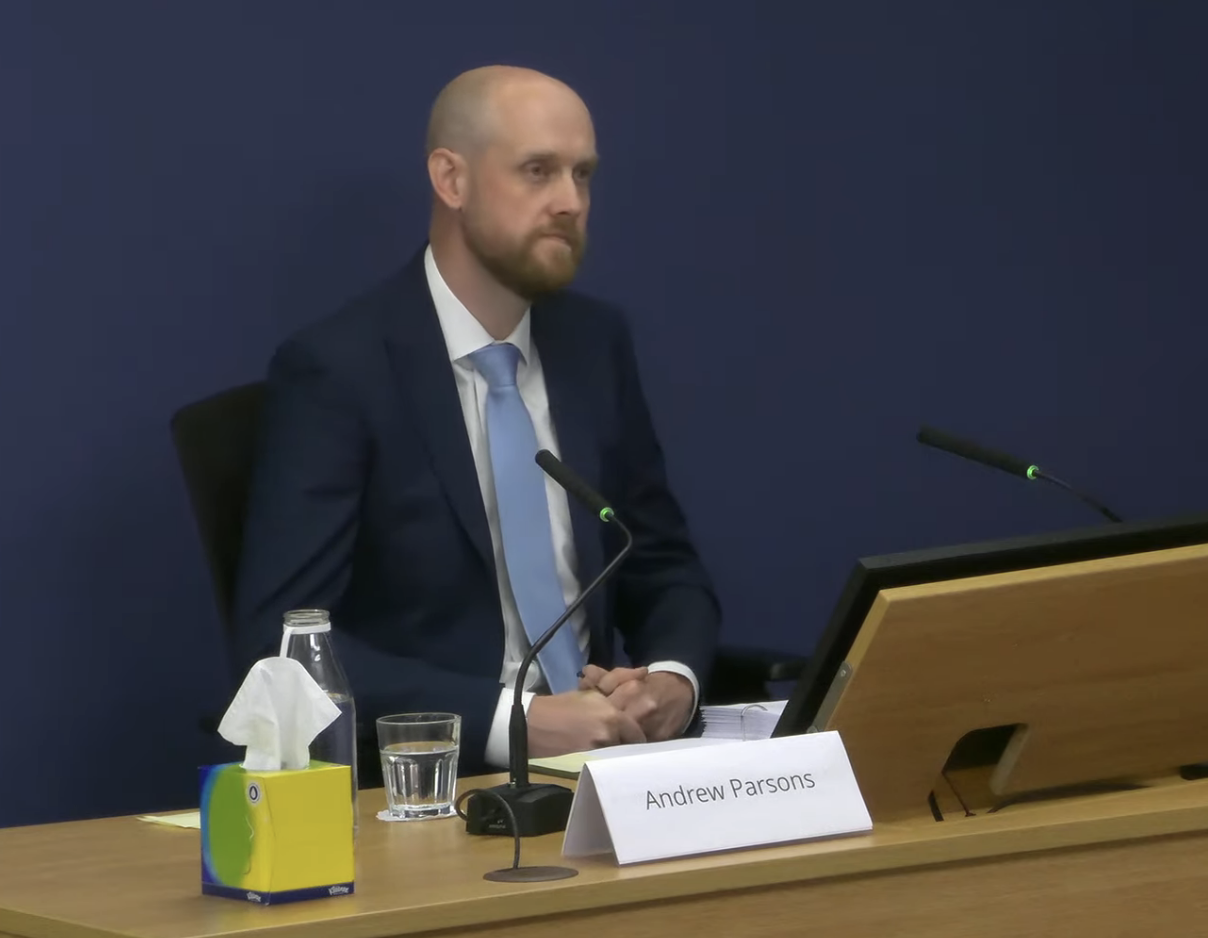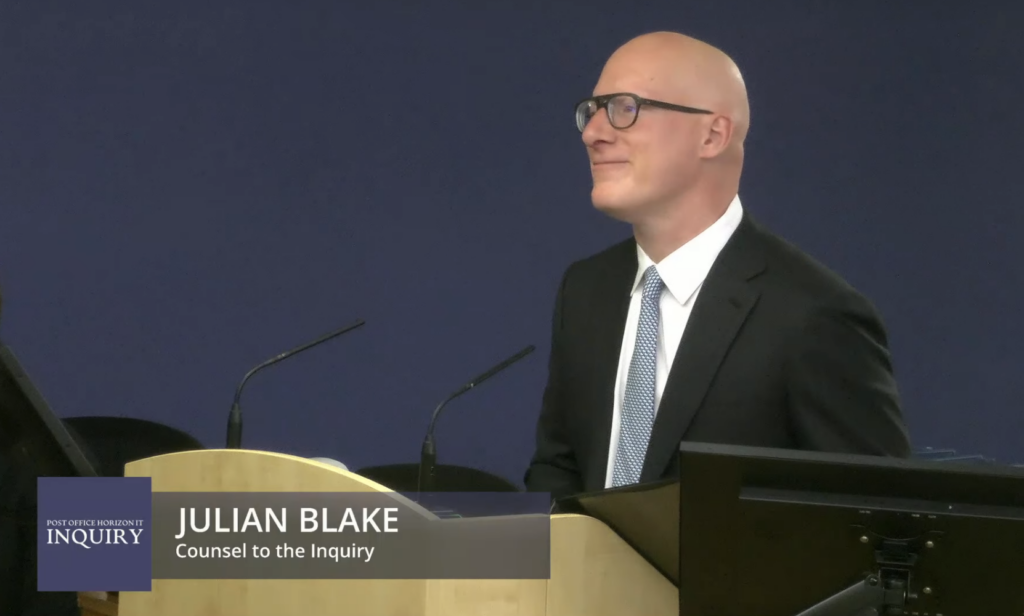
A civil litigation lawyer instructed by the Post Office branded campaigning former Subpostmasters Jo Hamilton, Noel Thomas and Seema Misra “liars and criminals” whilst discussing PR strategy with his clients.
Andy Parsons from Bond Dickinson was advising the Post Office on their media response to a 2015 episode of Panorama which featured all three Subpostmasters. In an internal email to the Post Office legal team, revealed today at the Post Office Horizon IT Inquiry, Parsons noted that trying to argue the technical legal points around the prosecution of Jo Hamilton would not be “worthwhile” as the “man in street” would legitimately ask where the evidence of Hamilton “putting the money in her pocket” actually was. He therefore suggested going after the Subpostmasters’ credibility “by calling out Thomas, Misra and Hamilton as the liars and criminals that they are” using “punchy language”.
During his evidence Parsons did not apologise for his characterisation of Subpostmasters as “liars and criminals”. When asked how it was justifiable (given he was already fully appraised of issues concerning remote access to branch accounts and the First Clarke Advice which highlighted serious problems with Post Office prosecutions), Parsons merely conceded his language was “too strong”.
This was about as much ground as Parsons was prepared to concede over a day’s questioning at the Inquiry. He accepted there were “some points” when he was “too adversarial” in his approach towards Second Sight, the investigators hired by the Post Office to investigate Subpostmasters’ concerns. When asked by Inquiry barrister Julian Blake if he should have dialled it in a bit, he said “With hindsight, I wish that I had.”
He also noted it was a “point of regret” he did not do enough to “press” the Post Office to tell Second Sight about Fujitsu’s ability to access and change branch data in Horizon when he knew about it in 2014, an issue which might be explored more fully by barristers for the Core Participants tomorrow.
Parsons was not a man to express much regret whilst he was active on the Post Office case. When it came to correcting accounting errors caused by a Horizon bug, Parsons changed the terminology in the letters which went out to Subpostmasters. “I don’t think we should apologise”, he wrote to his colleague. “I know this sounds hard but in apologising we are admitting some degree of culpability. I think we should maintain a more cold, procedural approach.”
Lack of production
John Scott’s alleged shredding “frolic” (as Simon Clarke described it in his evidence to the Inquiry) was in mind (though not mentioned) today as Parsons’ problem with putting things in writing was explored by Julian Blake.
Though Parsons admitted it was “best practice” for the Post Office to notify its insurers about the First Clarke Advice, he expressed a concern in July 2013 “that it would look bad… if it ever became public knowledge.”
Parsons recommended that “rather than sending a formal written notification” the Post Office “verbally notifies” its insurers “so as to not leave a paper trail.”
It was Parsons’ advice during a meeting that same month to discuss Horizon issues which (via the Jarnail Singh word-mangler) led directly to Clarke’s “Shredding” Advice. Parsons addressed the meeting, telling all those present to be wary about putting things in writing. The minutes record Parsons “spoke about emails, written comms, etc … if it’s produced it’s then available for disclosure, if it’s not then technically it isn’t.”
When Blake raised this at the Inquiry today, Parsons denied telling people not to write things down, claiming the minutes gave the wrong impression.
Abusing his privilege
Blake spent much of the day trying to demonstrate to the Inquiry that throughout Parsons’ work on the Post Office account he improperly cloaked damaging information in legal and professional privilege.
The basic thrust of privilege is that lawyers can assert confidentiality over information which passes between them and their client. This is a proportional exercise based on the extent to which the information qualifies as legal advice (all of which is arguable), but the advantages can be huge.
If something is deemed privileged it doesn’t have to be disclosed (handed over to the public, your opponents or a court) – ie it can be kept secret. Privilege is regularly abused in legal circles and Blake did his best to demonstrate that Parsons was a serial abuser, citing a presentation he gave to Alice Perkins, Paula Vennells and the Project Sparrow team in 2013 which stated:
“A reminder, legal privilege = vital to success. Do not discuss any legal advice or anything to do with Subpostmaster settlements with anyone outside the post office [including] JFSA, Second Sight, Subpostmasters… the Department for Business and Industrial Strategy, Members of Parliament, even your teams, unless absolutely necessary.”
Blake wondered if this strongly-worded policy given to the very top bods at the Post Office: “was in some way responsible for a lack of information transferring within the company?”
“I don’t think anyone would have interpreted that as somehow putting a block on information being passed up to senior management”, replied Parsons.
“It says… don’t discuss any legal advice even with your own team”, replied Blake.
Parsons was unruffled: “that’s not just advice that I’m providing, that is the state of the law on legal advice privilege, which provides that legal advice privilege doesn’t extend to the entire client organisation but only those groups within the organisation who need to receive that advice.”
Could Be Disastrous
Blake took him to the example of a Post Office counter located in a branch of McColls which in April 2018 had trouble balancing due to an issue which was plainly the Post Office’s fault. The only way to fix this was by using remote access. Given the Bates v Post Office litigation was swinging its way towards trial, and the Post Office’s defence was based on the idea that remote access was not possible, this was a problem. But how to stop the truth getting out? Parsons leapt into action, telling the Post Office:
“We the legal team need to take charge of this process. Whatever documents are produced are likely to be disclosable and I would like as far as possible for this to be covered by privilege or have controlled their content.” Parsons instructed all work on the intervention stop, with all emails “past and future” sent to his colleague Jonathan Gribben. He finally demanded Fujitsu “produce for us a full and privileged note on what has happened and why there is no alternative but to edit the data”. Parsons warned “I understand that this is going to cause operational problems and risks in this branch, but if not handled properly, this could be disastrous for the group litigation.”
Blake observed this was:

“a technical issue with a branch. Not a claimant’s branch. A random branch that is affected that needs a correction, and your advice is, let’s cover this in privilege because it could be disastrous for the group litigation.“
Parsons was, again, unruffled. “All of these decisions are context-specific”, he said. “We’re in the middle of a large piece of litigation, an issue has arisen that is related to one of the key issues in the litigation. I think it’s appropriate for any organisation to avail itself of legal privilege to investigate that issue.”
Parsons found it less easy to defend a privilege argument inserted into an email written by a junior employee. During the Bates v Post Office litigation, a newly-qualified lawyer called Amy Prime had drafted an email to Rodric Williams at the Post Office who was seeking advice after the Subpostmasters’ lawyers Freeths had asked for versions of the Post Office’s criminal investigation guidelines, the oldest of which dated back to 1998.
Prime asked Parsons to take a look at her draft response. He responded: “try to always spell out exactly what is required from the client, even if that is nothing” and then inserted into the email:
“For now, we’ll do what we can to avoid disclosure of these guidelines and try to do so in a way that looks legitimate. However, we are ultimately withholding a key document, and this may attract some criticism from Freeths. If you disagree with this approach, do let me know. Otherwise, we’ll adopt this approach until such time as we sense the criticism is becoming serious.”
Blake reminded Parsons this was about “guidelines that led to people’s investigation, subsequent prosecution [and] conviction.”
“No”, cavilled Parsons. “The request was for investigation guidelines in the broader sense, so it could have included any form of investigation.“
“OK,” accepted Blake “So not limited to criminal prosecutions, but including investigations that led to criminal prosecutions.”
“Correct.”
“Including investigations that led to people wrongly losing their jobs.“
“Yes, I guess so, if you’re going to draw that line directly.“
“Investigations that led to people becoming bankrupt?“
“Yes.“
“And irrespective of your reference to doing so in a way that looks legitimate, you are saying that you are advising a client that you can withhold what you considered at the time to be a key document until the criticism is such that it’s becoming serious?”
Parsons admitted the email was “poorly worded”, adding a rare “I regret sending it”, but he held his ground. “Having looked at it again”, he told the Inquiry, “I believe there were legitimate grounds to not disclose those two documents at that point in time.”
Parsons built his wealth, career and reputation defending the Post Office’s ultimately indefensible case. It doesn’t look like he will be losing any sleep over it.
For sight of some stunning documents and a blow-by-blow account of what happened today, click here.
The journalism on this blog is crowdfunded. If you would like to join the “secret email” newsletter, please consider making a one-off donation. The money is used to keep the contents of this website free. You will receive irregular, but informative email updates about the Post Office Horizon IT scandal.

Leave a Reply